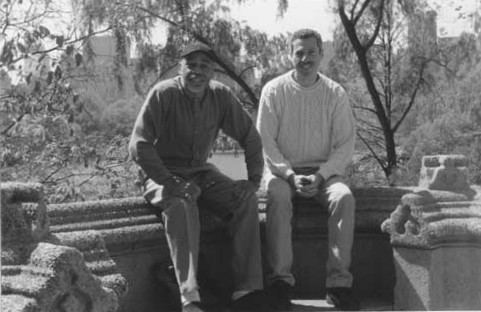Difference between revisions of "Doug Robinson and Larry Sauer"
Rlschlittler (talk | contribs) |
|||
| Line 1: | Line 1: | ||
| − | |||
| Line 77: | Line 76: | ||
<div style="text-align: right; direction: ltr; margin-left: 1em;"> | <div style="text-align: right; direction: ltr; margin-left: 1em;"> | ||
| − | Return to [[Out and Elected in the USA]] index • Go to [[Marilyn Shafer|next article]] | + | Return to [[Out and Elected in the USA: 1974-2004]] index • Go to [[Marilyn Shafer|next article]] |
</div> | </div> | ||
| − | For information on a touring exhibit version of ''Out and Elected in the USA'', contact Ron Schlittler at [mailto:rlschlittler@verizon.net rlschlittler@verizon.net]. | + | For information on a touring exhibit version of ''Out and Elected in the USA: 1974-2004'', contact Ron Schlittler at [mailto:rlschlittler@verizon.net rlschlittler@verizon.net]. |
| − | {{Curated Exhibit|exhibit name and link=[[Out and Elected in the USA | + | {{Curated Exhibit|exhibit name and link=[[Out and Elected in the USA: 1974-2004]]|firstname=Ron|lastname=Schlittler}} |
Latest revision as of 23:37, 11 April 2009
|
Doug Robinson Born March 26, 1951 School Board, District 2 New York, New York 21,000 children in District 2 |
Career Overview Elected May 1996 Re-elected 1999 |
|
Larry Sauer Born January 17, 1953 School Board, District 3 New York, New York 15,000 children in District 3 |
Career Overview Elected May 1996 School Board President July 1996 – June 1997 Re-elected 1999 |
Interview with Doug Robinson for Out and Elected in the USA
Q: You are not planning to run for the School Board again. Why not?
A: It’s tough in a time where school boards are being bashed left and right and where the state legislature took away most of our powers, although in the rest of the state the school boards have much more power in terms of controlling budget and those kinds of things. We’re basically an advisory board and we do liaison work with the schools now – so the meat and guts of it have been taken away, except we do appoint the superintendent. So it’s tough.
Q: With a few years yet for you to go, do you feel that it is all time well spent?
A: Well, I’ve certainly tried to make the best out of it. I’ve tried to help people – and concerning gay families, I’ve pushed for policies that support les-bi-gay kids and les-bi-gay families, and that’s been very good. By example, I have gotten more teachers to come out – even our former superintendent was a lesbian and she was pretty much closeted, but I think we helped her to come out a little bit more. She was not willing to come out publicly as a lesbian, but she is a lot more open and she was very supportive of us getting things done for kids. We have a Project 10 program in our district and we are the only one in our state to have it, although a couple of districts are now following suit. We have gotten teachers and principals to be trained around les-bi-gay issues and we want to continue that. We were the first district in the city and, think in the state if I’m not mistaken, to have in our sexual harassment policy include a section about les-bi-gay children. So, those things have been rewarding. You know, you are up there, you’re looking at policy, because that’s what we do.
Interview with Larry Sauer for Out and Elected in the USA
Q: What do you do in your role as school board member when you make in-school visits?
A: With my ability to listen and to build on all of the information I’ve gained over the years I’ve learned to visit schools with a very sharp eye as to if it’s just PR or reality I’m observing about how things are improving. I ask very succinct questions about things like the number of guidance counselors and I’ve actually caused an increase in guidance counselors, which allows our small schools to have a whole guidance counselor rather than sharing one – which certainly serves children in a much more complete way. I’ve been able to advocate for librarians in our small schools where they were not originally funded for them. I’ve been able to advocate for deepening of curriculum after listening to parents as to why they choose certain of our schools during middle school choice, and help schools that are not getting as much interest as they would like to add things – like two schools that will be adding Spanish, adding foreign language, which will help increase a wider range of students choosing that in our choice process. I like to be sure that the work the superintendent plans to do and works hard to implement is successful in reaching the classroom – turn-keyed by the school leaders so that better educational practices are actually in the classroom. I think I’ve learned enough to really challenge school leaders to be better and provide more. Because of my questioning, all children that are retained need to be monitored the following year for their success. I want to ensure their needs are being met so that they will improve and to ensure that they are successful – so that attention is brought to the neediest children so that they’re not written off as hard learners, “so why make the effort.” I believe that our efforts need to go the neediest – not at the expense of the less needy, but still, we need to pay attention to the neediest.
Return to Out and Elected in the USA: 1974-2004 index • Go to next article
For information on a touring exhibit version of Out and Elected in the USA: 1974-2004, contact Ron Schlittler at rlschlittler@verizon.net.
